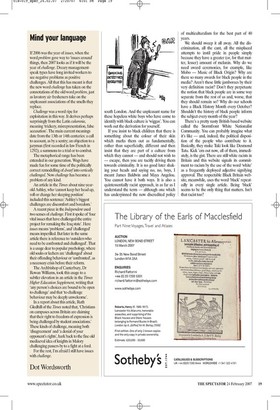Mind your language
If 2006 was the year of issues, when the word problem gave way to 'issues around' things, then 2007 looks as if it will be the year of challenge. Dreary managementspeak types have long invited workers to see negative problems as positive challenges. All that this has meant is that the new word challenge has taken on the connotations of the old word problem, just as lavatory air-fresheners take on the unpleasant associations of the smells they replace.
Challenge was a word ripe for exploitation in this way. It derives perhaps surprisingly from the Latin calumnia, meaning 'trickery, misrepresentation, false accusation'. The main current meanings date from the 13th or 14th centuries: a call to account, as by a sentry; an objection to a juryman (first recorded in law French in 1292); a summons to a trial or to combat.
The metaphorical range has been extended in our generation. Wags have made fun for some time of the politically correct remodelling of dwarf into vertically challenged. Now challenge has become a problem of any kind.
An article in the Times about nine-yearold Ashley, who 'cannot keep her head up, roll or change her sleeping position' included this sentence: 'Ashley's biggest challenges are discomfort and boredom.'
A recent piece in the Independent used two senses of challenge. First it spoke of 'four vital issues that have challenged the entire project for remaking the Iraq state'. Here issues means 'problems', and 'challenged' means imperilled. But later in the same article there is reference to 'outsiders who need to be confronted and challenged'. That is a usage dear to popular psychology, where old soaks or lechers are 'challenged' about their offending behaviour or 'confronted', as a necessary crisis before their reform.
The Archbishop of Canterbury, Dr Rowan Williams, took this usage to a subtler elevation in an article in the Times Higher Education Supplement, writing that 'any person's choices are bound to be open to challenge' and that 'to challenge behaviour may be deeply unwelcome'.
In a report about this article, Ruth Gledhill of the limes noted that, 'Christians on campuses across Britain are claiming that their right to freedom of expression is being challenged by student associations.' These kinds of challenge, meaning both 'disagreement' and 'a denial of your opponent's rights', hark back to the fine old mediaeval idea of knights in Malory challenging passers-by to a fight at a ford.
For the rest, I'm afraid I still have issues with challenge.
Dot Wordsworth






















































 Previous page
Previous page